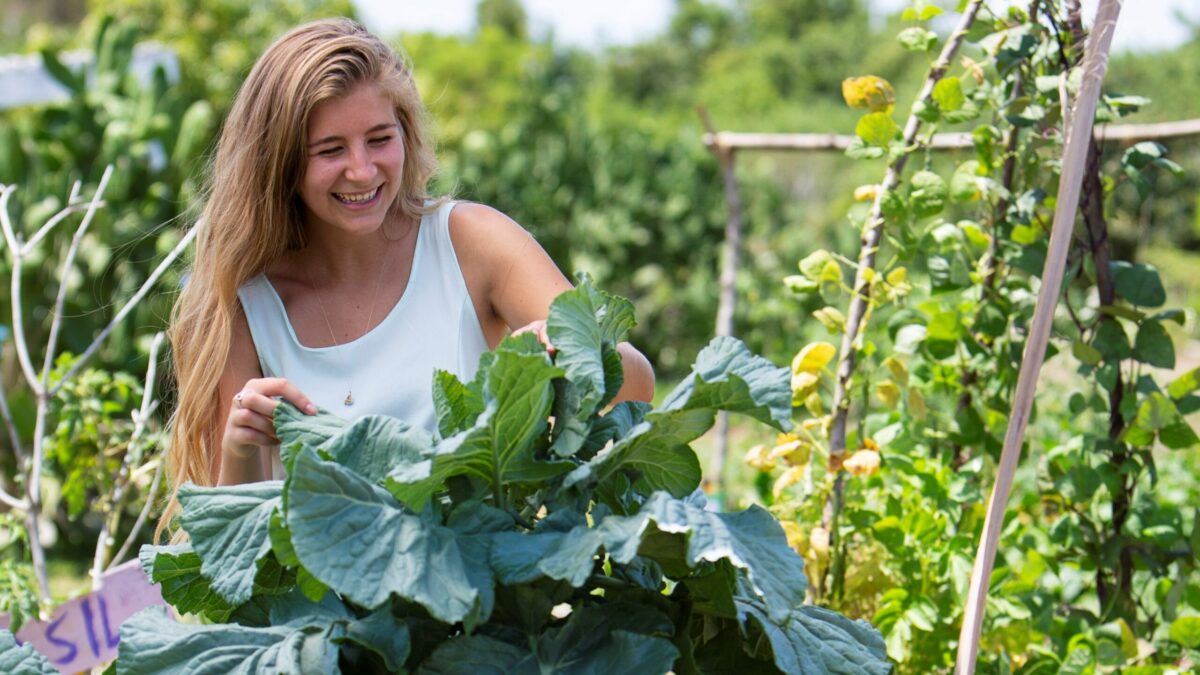Full Circle: College-level Research Inspires Shannon Tivona to Create Corporate Sustainability Tool
- by Peter Todaro

Shannon Tivona at the Eckerd Community Farm. Photo credit: Michel Fougeres
As a student at Eckerd College in St. Petersburg, Florida, Shannon Tivona was not one to sit idly by.
From the start of her second year on campus, Shannon was on a mission. Between classes and squeezing in trips to Eckerd’s beautiful white sand beaches, she founded Eckerd’s Food Recovery Network chapter, served as Director of the Eckerd College Organization of Students Culinary Relations Committee, and created the plan for what would become the Eckerd Community Farm, now a centerpiece of the school’s sustainability initiatives.
Central to each of these endeavors was the link between sustainability and dining, where Shannon found a collaborative partner and friend in then-General Manager Eric Foster and the Bon Appétit team.
As Shannon pursued her degree in Environmental Studies, she took advantage of Eckerd’s status as a leader in facilitating undergraduate research, joining Professor Jesse Sherry in conducting a study that married her passion for sustainability and food. While she didn’t know it then, the study, which entailed a life-cycle assessment of the greenhouse gas potential of food products, would come to have a profound impact on the course of her career.
Shannon spent a summer poring over data, which was then plugged into lifecycle assessment software generating information about the carbon-intensity of specific foods. Professor Sherry and Shannon molded this data into advice for foodservice operators on how to reduce emissions, as well as a data-driven, behaviorally based “Reimagine, Replace, Reduce” decision-making framework modeled on the Environmental Protection Agency’s Food Recovery Hierarchy. The framework helps operators make purchasing and serving low-carbon foods easy and convenient for food service operators.
Between the study’s completion and its publication this year, Shannon graduated from Eckerd and brought her passion for sustainability and talent for number-crunching someplace very familiar – Bon Appétit!
Joining the company as a Fellow in 2018, she traveled to colleges and universities across the country, educating stakeholders about food systems issues and deploying best practices to help teams with sustainability challenges on their campuses. After graduating from the Fellows program, Shannon joined the corporate team as a Junior Product Manager, working with a small group to develop the second iteration of Bon Appétit’s pioneering transparency and sustainability reporting tool, the Food Standards Dashboard.
It was while brainstorming new indicators for the Dashboard that things came full circle. Using findings from the study as inspiration, Shannon suggested adding a Carbon Impact indicator, which measures both the carbon emissions and spend of the highest climate impact foods, allowing Bon Appétit teams to identify when their spend causes the carbon-intensity of their menus to spike, and make adjustments accordingly.

The Carbon Impact indicator in Bon Appétit’s Food Standards Dashboard 2.0
For Shannon, working with the Bon Appétit team and conducting research with Professor Sherry was instrumental to her success. “Having the opportunity to conduct this research with real-world data allowed me to jumpstart my career in sustainability,” says Shannon. “I was able to take the knowledge I gained from this case study and use it to build better sustainability technology to help Bon Appétit chefs achieve carbon reductions. It was an amazing experience to go from building life cycle assessment models for each individual food product to getting to work on the tools needed to implement the changes recommended by the research.”
Now a Product Manager in charge of the development of Bon Appétit’s Waste Not™ program, Shannon’s future in sustainability is bright – limited only by her ambitions.